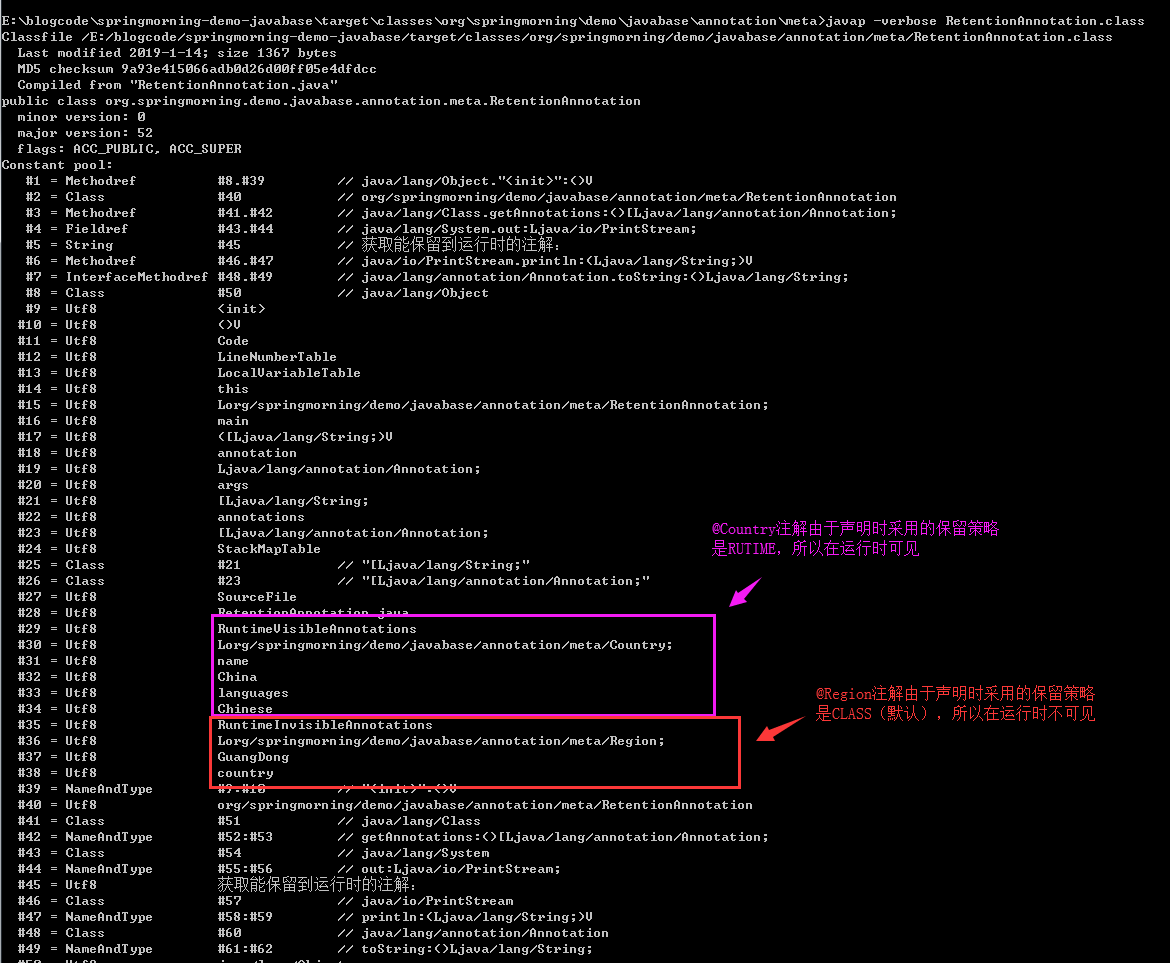JavaSE基础:@Retention元注解的使用
@Retention注解标记其他的注解用于指明标记的注解保留策略:
先看Java SE 8中@Target是如何声明的:
package java.lang.annotation; public enum RetentionPolicy { /** * Annotations are to be discarded by the compiler. */ SOURCE, /** * Annotations are to be recorded in the class file by the compiler * but need not be retained by the VM at run time. This is the default * behavior. */ CLASS, /** * Annotations are to be recorded in the class file by the compiler and * retained by the VM at run time, so they may be read reflectively. * * @see java.lang.reflect.AnnotatedElement */ RUNTIME }
从源代码的注释中,我们看到java.lang.annotation.RetentionPolicy此枚举类声明了三种保留策略:
java.lang.annotation.RetentionPolicy.SOURCE:表示注解会在编译时被丢弃
java.lang.annotation.RetentionPolicy.CLASS:默认策略,表示注解会在编译后的class文件中存在,但是在运行时,不会被VM保留。
java.lang.annotation.RetentionPolicy.RUNTIME:表示不仅会在编译后的class文件中存在,而且在运行时保留,因此它们主要用于反射场景,可以通过getAnnotation方法获取。
这三种保留策略的使用示例:
声明@Country注解,采用的是RUNTIME策略:
import java.lang.annotation.ElementType; import java.lang.annotation.Retention; import java.lang.annotation.RetentionPolicy; import java.lang.annotation.Target; /** * @author 编程老司机 */ @Target(ElementType.TYPE) @Retention(RetentionPolicy.RUNTIME) public @interface Country { //国家名称 String name(); //国家语言 String[] languages(); }
声明@Region注解,采用的是CLASS策略(默认策略):
import java.lang.annotation.ElementType; import java.lang.annotation.Retention; import java.lang.annotation.RetentionPolicy; import java.lang.annotation.Target; /** * @author 编程老司机 */ @Target(ElementType.TYPE) @Retention(RetentionPolicy.CLASS) public @interface Region { //地区名称 String name(); //所属国家 String country(); }
声明@Home注解,采用的是SOURCE策略:
import java.lang.annotation.ElementType; import java.lang.annotation.Retention; import java.lang.annotation.RetentionPolicy; import java.lang.annotation.Target; /** * @author 编程老司机 */ @Target(ElementType.TYPE) @Retention(RetentionPolicy.SOURCE) public @interface Home { //成员 String[] members(); //地址 String address(); }
编写测试类:
import java.lang.annotation.Annotation; /** * @author 编程老司机 */ @Country( name = "China", languages = {"Chinese"} ) @Region( name = "GuangDong", country = "China" ) @Home( members = {"Wolffy","Wolnie","Wilie"}, address = "Qingqing grasslands" ) public class RetentionAnnotation { public static void main(String[] args) { Annotation[] annotations = RetentionAnnotation.class.getAnnotations(); System.out.println("获取能保留到运行时的注解:"); for (Annotation annotation :annotations){ System.out.println(annotation.toString()); } } }
运行结果:
获取能保留到运行时的注解:
@org.springmorning.demo.javabase.annotation.meta.Country(name=China, languages=[Chinese])
采用javap命令分析RetentionAnnotation的class文件如下图:

下节继续
下节将给大家讲解元注解@Document的使用。



